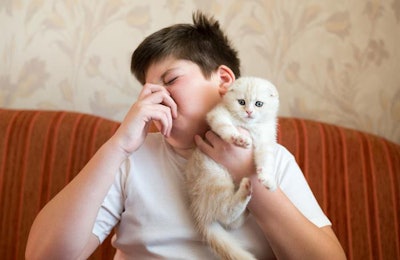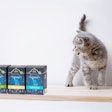
Antibodies start fighting infection in animals’ bodies by attaching to invading organisms, or other things the body identifies as a threat such as allergens. Once attached, the antibodies either block the foreign body’s activity or mark it for destruction by other cells. Using that knowledge, scientists found an antibody in eggs that, when included in cats’ diets, can neutralize a chemical involved in human’s allergic reaction to felines. They presented their findings at the European Academy of Allergy and Clinical Immunology (EAACI) Congress in June.
Science behind egg antibodies and cat allergy
Cats naturally produce an allergen, Fel d1 glycoprotein, and release it in their saliva, which they then spread to their fur while grooming. From there it can trigger allergic reactions in people. An antibody found in eggs, known as IgY, attaches to and neutralizes that allergen while it's still in cats' saliva. Previous work has focused on administering that antibody directly to people with allergies.
Ebenezer Satyaraj, PhD, director of molecular nutrition at Purina, led a team of scientists examining the feasibility of using egg-based ingredients in cat food to reduce the degree to which cats incite allergic reactions. Researchers at Washington University School of Medicine in St. Louis also participated.
They found that when egg IgY antibodies are introduced to cats’ diets they result in reduced activity of the Fel d1 allergen in cats’ saliva that is subsequently transferred to fur.
“It’s important to clarify that we aren’t reducing production of Fel d1, we are instead neutralizing it after it is naturally produced,” Satyaraj told Petfood Industry in an email. “In fact this was an important strategy behind our research – we didn’t want to stop the production of Fel d1 because currently it is not clear what role it has in the cat. The anti-Fel d1 antibody (IgY) has no impact on Fel d1 production. Instead, the antibody neutralizes the Fel d1 in the cat’s saliva. The anti Fel d1 antibody blocks specific binding sites on the Fel d1 so it is unable to bind to human immunoglobulin E (IgE) and trigger a response in cat allergen-sensitized people. After neutralization, the Fel d1 is no longer recognized by the body as an allergen.”
Cat food formulators blended the anti-Fel d1 antibody as an egg product ingredient into a nutritionally balanced, complete diet.
“In doing this, we were able to ensure that the diet was highly palatable,” he said.
So far, there are no cat food products using the egg antibodies, and Satyaraj couldn’t share any product plans.
“Right now, we are focused on sharing the research with the scientific community,” he said.



















